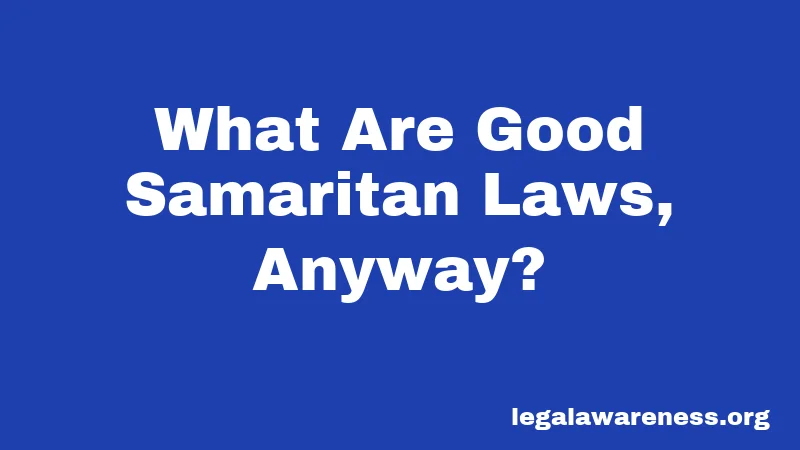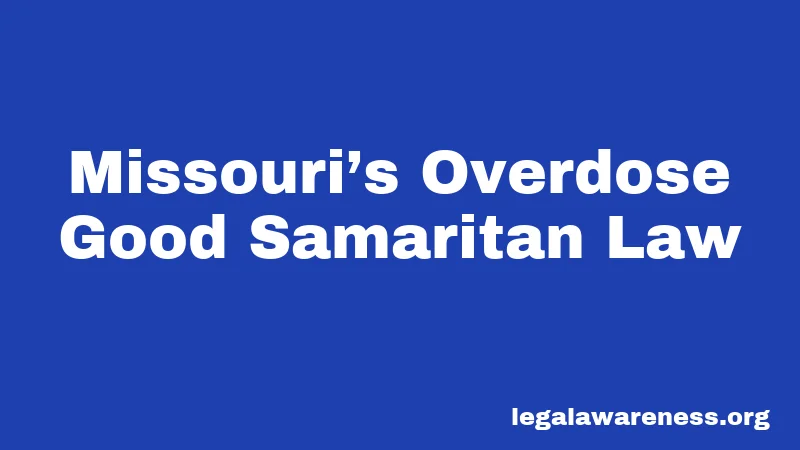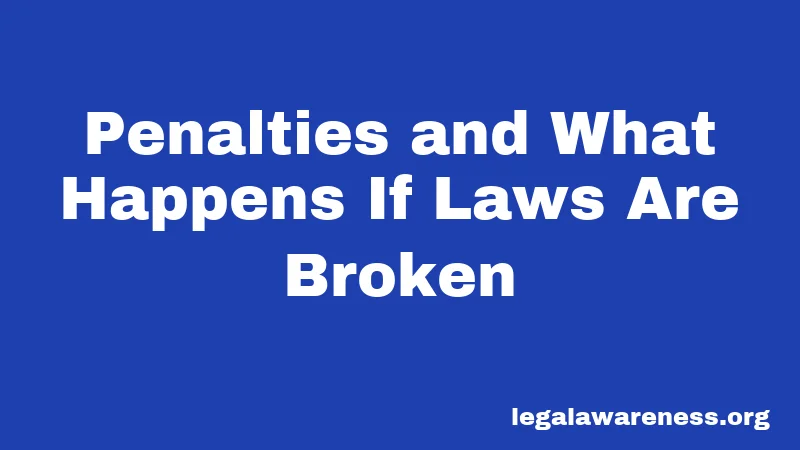Good Samaritan Laws in Missouri (2026): Protection for Those Who Help
Most people have no idea this is even illegal. Seriously. Think about it. You see someone collapse. You jump in to help. Then you get sued. It happens. But Missouri gets it. The state actually has laws designed to protect you when you help someone in an emergency. Let’s talk about what these laws do and who they actually protect.
Good Samaritan laws sound simple, right? Help someone without getting in trouble. But here’s the thing—these laws are way more specific than most people realize. They protect certain people in certain situations. We’re gonna break down exactly how they work.
What Are Good Samaritan Laws, Anyway?

Here’s the simple version: Good Samaritan laws protect people who help others in emergencies. They’re basically saying, “Hey, if you jump in and help someone and something goes wrong, you probably won’t get sued.”
The idea is pretty straightforward. Without these laws, people would hesitate to help. They’d see someone in danger and think, “What if I mess up? What if they sue me?” Good Samaritan laws exist to remove that fear. They encourage people to act in emergencies without worrying about lawsuits.
But—and this is important—these laws have limits. They don’t protect everyone equally. Missouri actually has two different Good Samaritan laws. One for medical emergencies. One specifically for overdoses. They work differently, and knowing the difference matters.
Missouri’s Medical Good Samaritan Law
This one’s in Section 537.037 of Missouri’s laws. Think of it as the main Good Samaritan law for medical emergencies.
Who Gets Protected?
Here’s where things get specific. Pretty straightforward.
Doctors and surgeons get protection. Nurses—both registered and licensed practical nurses—get it too. Emergency medical technicians (EMTs) are covered. Mental health professionals are in there. So are physician assistants and certified nurse practitioners.
But wait, there’s more. If you’ve taken a recognized first aid training course, you’re protected too. This is key. You don’t need a medical license. You just need official training. That counts.
Here’s the kicker: If you’re trying to stop a suicide, anyone gets protection. Even untrained bystanders. You don’t need a license. You don’t need training. If you’re trying to prevent someone from harming themselves, Missouri has your back.
What Exactly Does Protection Mean?
Okay, so you help someone in an emergency. You do it without being paid. You do it in good faith. Under Missouri law, you’re protected from civil lawsuits. This means the person you helped can’t sue you for damages.
But there’s a catch. Your protection goes away if you act badly. If you show gross negligence, the law won’t help you. If you do something willfully or wantonly harmful, protection is gone. Basically, if you’re reckless or acting on purpose to harm someone, you’re on your own legally.
Here’s a mini example: You perform CPR and crack someone’s ribs. You’re protected. Those cracked ribs are a normal risk. But if you push the person down a flight of stairs while “helping,” protection is gone.
What If You’re Just a Regular Person?
Not everyone gets equal protection. This part’s important.
If you’re an untrained bystander helping with a medical emergency—not a suicide prevention situation—Missouri law doesn’t protect you. You could face a lawsuit. That’s the reality.
Okay, pause. Read this carefully. Many people think Good Samaritan laws protect everyone who helps. They don’t. They really don’t. Missouri protects medical professionals and trained first aid responders. Regular people? Not as much.
There’s an exception though. If you’re trying to prevent a suicide, you get full protection even without training. That’s it. That’s the one situation where Missouri says untrained people are totally covered.
Missouri’s Overdose Good Samaritan Law

Now this one is different. And honestly, this one saves lives.
Back in 2017, Missouri passed a specific law about overdoses. It’s in Section 195.205. The goal was simple: get people to call 911 when someone overdoses. They wanted to remove the fear of legal trouble.
How Does It Work?
Let’s say your friend overdoses. You call 911 immediately. Police show up and find drugs in your pocket. Normally, you’d get arrested. But this law says no—you’re protected.
Both people get protection. The person who calls for help. The person overdosing. Both are shielded from prosecution for drug possession charges and related violations.
Think of it like immunity. You won’t be arrested. You won’t be charged. You won’t be convicted. Police can’t seize your property either. Pretty significant, right?
What Violations Does It Cover?
The law protects you from prosecution for possession of controlled substances. It covers drug paraphernalia. It includes imitation controlled substances. Possession of alcohol as a minor? Covered. Altered ID? Covered. You’re also protected from violations about alcohol and even some parole violations.
But—and this is crucial—it doesn’t cover everything. You’re not protected if you sold the drugs. You’re not protected if you manufactured them. Distribution charges? Still possible. Manslaughter? You could still face that.
These exceptions matter. A lot. Honestly, this is where people get confused. The law protects those seeking help. It doesn’t protect dealers or manufacturers.
The “Immediate Action” Rule
Here’s where it gets complicated. And stay with me here.
In 2022, a Missouri court made a decision that limited this law in a surprising way. They basically said you have to call 911 immediately. Not five minutes later. Not after checking their breathing. Immediately.
This ruling caught a lot of people off guard. It changed how the law actually works. Many people think the law is more flexible than it actually is. Courts have been strict about the timing.
Wondering if this applies to you? If you’re ever in this situation, call 911 right away. Don’t delay. Don’t think about it. Call. That’s your best bet legally.
Medical Emergencies Outside the Overdose Law
Missouri’s law is pretty clear about where it applies. Medical professionals and trained responders get protection at the scene of an emergency. This means outside a hospital. Outside a doctor’s office. In the field. At the accident site.
Police officers have to follow rules too. If they respond to an overdose, they’re supposed to provide information about treatment resources. They’re supposed to help connect people to services. It’s built into the law.
But what happens if you’re giving care in a hospital emergency room? The law doesn’t cover that. Protection is only for the scene of an emergency. Once someone’s in a medical facility, it’s different.
Suicide Prevention Is Special
This section deserves its own attention. Suicide prevention gets the broadest protection.
Mental health professionals—therapists, counselors, psychologists—get protection. Doctors get protection. But here’s what’s wild: anyone can try to prevent suicide and get protection. A random stranger. Your neighbor. Your friend. As long as you’re acting in good faith, you’re covered.
The law wants to encourage people to help stop suicides. It removes the fear of legal consequences. This is one area where Missouri says everyone’s protected equally.
Penalties and What Happens If Laws Are Broken

Wait, this section’s a bit different. These laws aren’t usually “broken” in the criminal sense. They’re either followed or not followed by the person offering help.
If you don’t have protection—like you’re an untrained person helping with a medical emergency (not a suicide)—and you cause harm, the injured person can sue you. They can ask for money for damages. This could be medical bills, pain and suffering, lost wages, all of it.
In overdose situations, if you don’t call immediately, you might not get protection. You could be arrested for drug possession. You could face charges. You could be convicted.
The “penalty” isn’t about someone breaking the law. It’s about losing protection that would otherwise cover you.
Can You Get Sued Even With Protection?
Here’s an important reality check: Protection doesn’t mean you’re totally safe forever.
Someone could still sue you. The law doesn’t stop lawsuits. It just says they probably won’t win the case. The suit can get dismissed, but filing it is possible.
This can be stressful. Lawsuits cost money to defend against, even if you win. That’s why knowing your rights matters. You might need a lawyer to explain why the lawsuit should fail.
Special Situations Worth Knowing
Training Matters (Sort Of)
If you have formal first aid training, you get protection as a medical Good Samaritan. But you have to stay within your training level. If you have basic CPR certification, you can do CPR. You can’t perform surgery. You can’t do advanced procedures beyond your training.
The Person You’re Helping Matters
If you’re helping a minor in sports or an accident, you don’t need the parent’s permission. The law lets medical professionals help minors without consent if it’s an emergency. That’s important to know.
Private vs. Scene of Emergency
Location matters. You’re protected at the scene. This means right where the emergency happened. Not hours later at the hospital. Not at home the next day. At the scene, right then.
How to Protect Yourself If You Help
Here’s what you actually should do: Call 911 first. Seriously. Before anything else. Get professional help on the way.
Second, stay within your limits. If you don’t have training, don’t attempt advanced medical procedures. Stick to basic help. Recovery position. Keeping them awake. Basic first aid. That’s it.
Third, act in good faith. This means genuinely trying to help. Not for money. Not for attention. Just because someone needs help.
In overdose situations specifically, call 911 immediately. Don’t wait. Don’t think about consequences. Call. The law is there to protect you when you do this.
If you do help someone, get their name and contact info if possible. Get names of other witnesses. Document what happened. This helps if questions come up later.
If Police Show Up
Don’t panic. Be honest. Explain that you were trying to help. Explain that you called 911 in good faith. If it’s an overdose situation, mention that you were following the Good Samaritan law.
You have rights. You don’t have to answer all questions without a lawyer. If things seem serious, ask for a lawyer. It’s your right.
What Missouri’s Laws Don’t Do
Okay, let’s be clear about the limits. These laws don’t require you to help. You have no legal duty to jump in. You can walk past an accident. You’re not breaking the law. Good Samaritan laws protect those who choose to help. They don’t force anyone to help.
These laws don’t protect you from every lawsuit. Someone can still sue. The law just makes it easier to win the case against them.
These laws don’t cover gross negligence, willful acts, or wanton harm. If you’re obviously reckless, protection goes away.
The overdose law doesn’t protect dealers. It doesn’t protect manufacturers. It doesn’t cover every crime. Just drug and alcohol possession and related violations.
Real-Life Scenarios
Scenario One: CPR at a Restaurant
You’re eating dinner. Someone chokes. You know CPR. You perform it. The person’s ribs crack. They recover. Later, they consider suing. Missouri law protects you. You have a Good Samaritan defense. The case probably gets dismissed.
Scenario Two: Untrained Person Helps at an Accident
You come across a car accident. Someone’s bleeding. You have no first aid training. You help by calling 911 and staying with them. You tell them help is coming. You’re not protected as a Good Samaritan. But you also probably haven’t done anything harmful. Just calling 911 is actually good.
Scenario Three: Overdose Situation
Your roommate overdoses. You call 911 immediately. Police come. There are drugs in your room. You’re protected. You called for help in good faith. You acted immediately. The law covers you.
Scenario Four: Trying to Stop a Suicide
Your neighbor is talking about ending their life. They’re on a bridge. You try to talk them down. You stay with them until police arrive. Even with no training, you’re fully protected. Missouri says you did the right thing.
Frequently Asked Questions
Does Missouri’s Good Samaritan law protect me if I help a stranger?
It depends. If you’re a trained first aid responder or medical professional, yes. If you’re an untrained bystander helping with a medical emergency (not a suicide), no. If you’re trying to prevent a suicide, yes—fully.
What if I accidentally make things worse?
If you have protection and you acted reasonably without gross negligence, you’re covered. Accidents happen in emergencies. The law understands that.
Does this law protect me if I’m drunk while helping?
No. The law requires good faith. If you’re intoxicated, you’re probably not acting in good faith. You’re definitely showing poor judgment.
In an overdose situation, how immediately do I need to call 911?
Immediately. Courts have interpreted this strictly. Don’t delay. Call right away for the best legal protection.
What if I was involved in a crime and call 911 for an overdose?
In overdose situations, you get protection from drug and alcohol violations. But not from other crimes. If you committed something else, that’s separate.
Final Thoughts
Missouri’s Good Samaritan laws exist for good reasons. They protect medical professionals who help in emergencies. They protect trained responders. They especially protect anyone trying to prevent suicide. And they strongly protect anyone calling 911 for an overdose.
But here’s the honest truth: These laws have limits. They don’t protect everyone equally. Untrained people helping with regular medical emergencies don’t have the same protection. Know your own situation.
The biggest takeaway? If you’re in an emergency, call 911. That’s the safest move legally and medically. Get professionals involved. Then, if you have training, help within your limits. Act in good faith. Do the right thing.
For overdoses specifically, call 911 immediately. Don’t wait. Don’t think about consequences. The law is designed to cover you when you do this. Use it.
When in doubt, ask a lawyer. These laws can be complicated. An attorney in Missouri can explain exactly how they apply to your specific situation. It’s worth the consultation.
Stay informed. Be ready to help when you can. And remember—these laws exist because Missouri believes helping others is important. Use that protection wisely.
References
- Missouri Revised Statutes Section 537.037 – Good Samaritan Law for Medical Emergencies
- Missouri Revised Statutes Section 195.205 – Good Samaritan Law for Drug Overdoses
- Time 2 Act Missouri – Being a Good Samaritan in Missouri
- Missouri Attorney General – Missouri Law Resources
- Partners in Prevention – Missouri’s Good Samaritan Law
